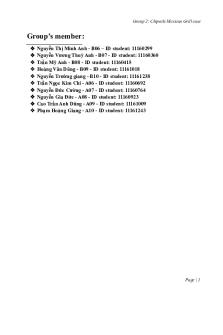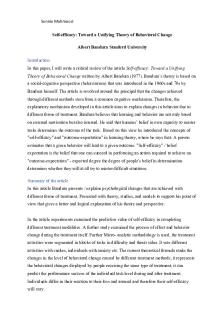Anurag Doshi 1914021 Individual assignment MPPO PDF

| Title | Anurag Doshi 1914021 Individual assignment MPPO |
|---|---|
| Author | Anurag Doshi |
| Course | MBA |
| Institution | Savitribai Phule Pune University |
| Pages | 10 |
| File Size | 309.5 KB |
| File Type | |
| Total Downloads | 35 |
| Total Views | 140 |
Summary
Teamwork Turmoil Case...
Description
1
Teamwork Turmoil Case Analysis Context This case revolves around troubles faced by the learning team at a big-name school in the eastern United States. Director of student affairs at the school generated team consists of six or seven individuals for each incoming first-year MBA class and a mentor from second-year MBA class is assigned to an individual group. These groups were carefully selected to work with individuals outside the classroom by mixing different class sections (from diversified backgrounds) with each other.
Below are the brief background details of the team and its
mentor: Team Members: 1) Tom Griffin: A self-professed introvert, more time in networking with banking alumni and recruiters, passionate about Chicago Baseball Team. 2) Sandeep Prasad: Indian citizen, High involvement in the informal Indian club, want to pursue consulting and hoping to get a visa to work and live in the USA. 3) Jennifer Martin: Only woman in the group, brains with beauty, came from a mixedrace family, very involved in the school community, career focus on private wealth sector. 4) Darren Onyealisi: Nigerian origin, got a scholarship for ethical leadership and spirit of inclusion, Not high involvement in the school community through “Big Brother” for local youths 5) Rob Delery: Only Scientist in the group, diversified experience in functional roles at varying locations, High involvement in the school community, want to pursue investment banking.
2
6) Jason Cooper: Only married member and formal athlete, high involvement in Christian Fellow Program, want to pursue a career in real estate. Team Mentor: Tony Marshall: Subject of the case, aware of the difference in first-years’ experience made by the first-rate learning team. Troubles faced by the team:
Stage:
According to Bruce Tuckman’s study (1965), the group evolves through above 5 stages. Currently, a team under consideration is suffering between “Forming” and “Storming” stage because:
It has been only 3 weeks into the first year, and the team is formed of the people from diversified backgrounds. They are almost strangers to each other.
There is almost no overlap in activities among the group apart from team discussion post-school.
3
Some of them are still trying to know each other by exploring each other’s boundaries.
A) Team Cohesion: It can be defined as the degree of attachment among the team members. The productivity of the team is directly proportional to Team Cohesion. Below are a few factors which are currently affecting team cohesion:
Similarity Issues: Each team member represents a different demographic.
Stability Issue: Team only spends time with each other during discussions. (Hardly 2-3 hrs. the night before the submission day)
Satisfaction: Team members are not able to match each other’s expectations.
B) Social Loafing: This phenomenon is observed when people put fewer efforts while working in a group compared to working alone (Max Ringelmann, 1913). e.g. Daren is having a casual approach towards team meetings and doesn’t show up regularly. Also, he tries to justify his absence or inefficiency by providing unacceptable reasons. C) Process Loss: This can occur due to aspects of group interaction that inhibit group functioning. There are multiple instances in the meeting which resulted in Process Loss. e.g. Delery had his reservations about the way meetings are conducted by Martin. D) Norms: Understanding of the norms help the team to perform efficiently. Not defining norms can result in poor output of the team meetings. e.g. 1) Daren didn’t come prepared for the meeting, resulting in lesser inputs and participation during the meeting 2) Delery was not aware that Daren was going to attend the meeting and in addition to that Darren was late to that meeting without prior notification. E) Unorganized meetings: These meetings are conducted in a highly unorganized manner, resulting in loss of a substantial amount of time. There is no clear definition
4
of the roles and tasks assigned. This situation ends up in jumping from one issue to another without finding the solution. e.g. Prasad shared his insights based on the stories he heard about OnStar Technology and interrupted Griffin when was providing insights as he spent some time on solving the questions. F) The rapport among team members: As the team members spend less amount of time with each other, there is very poor rapport among them. This is a very essential thing which is required for a group to function effectively. There are multiple instances of lack of rapport during the meetings. e.g. Griffin and Cooper constantly argue around the same idea, Delery shows reluctance to divide the work as he might need to cover up for Onyealisi. Lack of rapport results in Poor Management of Team Conflict which is essential for a team to reach stronger, more reasonable decisions. Action Plan for Improvement: Considering the diverse background of the team, it is expected that the team should be highly creative by bringing together different perspectives, skill-sets, and knowledge. But to leverage the benefits of the diversity few implementations need to be done for the proper functioning of the group: 1) Improve Cohesiveness:
Define the roles of each member of the team. Allow each team member to set a goal for themselves.
Highlight and appreciate each member’s contribution to the work. This will boost individual motivation level and willingness to contribute to tasks.
Maintain a sense of equality across the team.
2) Prevent Social Loafing:
5
Do not assign each task to all group members. Quantify the task for each member and set the deadline.
Evaluate each person’s contribution periodically and pivot whenever needed.
Design tasks in such a way that can make the team member come out of the comfort zone.
Provide help to an individual whenever needed. It will help to improve inclusivity across the group.
3) Designing Norms (which are acceptable by all):
Behavior during meetings: Improvement in the areas such as attendance, preparedness for the meeting and Usage of a cellphone can help to reduce the loss of productive time.
Constructing Criticism: It should be constructive and not belittle someone.
These norms should be decided and agreed upon collectively by each team member. If a team stick to these norms, it will improve the overall environment during the team meeting, further improving cohesiveness across the team. 4) Organized meetings with Agenda: Organizing a team meeting can be done with the help of below three steps at various stages: a) Before the meeting:
The requirement of the meeting: Commitment is needed to conduct a meeting effectively. If not required, details can be communicated through written communication.
Agenda: Setting an agenda will help to maintain flow and be on track.
Reminder before the meeting: Team will be better prepared and negative consequences can be avoided.
6
b) During the meeting:
Start on time: It will show respects for everyone’s time.
Stick to Agenda: This will result in more fruitful discussion and veering will be avoided.
Ensure active participation: It will reduce the effect of Social Loafing and group thinking.
Summarize minutes of the meeting (MOM): It will ensure that everyone is clear about the further action plan and time frame associated with it
End the meeting on time: Avoid spill over as it will once again reiterate the importance of an individual's time.
c) After the meeting:
Follow up on Action items: Periodic checks to keep track of the progress
5) Improve rapport: As explained earlier, our group is struggling between “Forming” and “Storming” stage. (more inclined towards the Storming stage). One of the reasons can be affiliated with the amount of time spent by the team members with each other. e.g. Prasad is highly involved with the Indian community whereas Daren is very less involved in school community activities apart from being “Big Brother”. There are chances that the team might be experiencing culture shock as each member of the team represent a different demographic background. This can be improved by shifting back to the Forming stage and improve rapport with the help of occasional team outings or dinners. During the outings, common bonding points can be explored organically, resulting in improved cohesiveness across the team. References: 1) https://en.wikipedia.org/wiki/Group_cohesiveness
7
2) “Organizational Behavior” (Author unknown) 3) http://pornpankajornkliforbsc304.blogspot.com/2014/06/5-stages-of-groupdevelopment.html
Managing People and Performance in Organizations EMAIL TO THE TEAM Individual Assignment
Student Name: Anurag Doshi Roll No: 1914021
8
Dear Teammates, As we recently completed the MPPO course, I tried to reflect on our group’s journey during Term-2 in relation to the concepts we learned in the course. I was amused to see how we, as a team, pulled off difficult tasks given such short deadlines. However, there are a few aspects where we could have done a much better job to improve the effectiveness of our outputs. In this mail, I have tried to summarize all the points to bring everyone on the same platform. Our Strengths:
Diversity: All 5 of us are coming from diverse background and work experience. It certainly helped us to get new insights while working on the projects.
Supporting the Leader and Filling in for someone: During one of the assignments, ABC was going through a rough patch. However, everyone in the team stood up and covered up for ABC and supported the Team Lead at that point of time.
Scope for improvement:
Cohesiveness and Rapport: Diversity has its own shortcomings. We spent very less amount of time with each other, resulting in conflicts during the final stages of submission. Also, there was a lack of constructive criticism during the discussions.
Social Loafing: Most of the times, DEF and ABC were either absent or wasn’t prepared for the meetings. Both didn’t contribute to primary and secondary research for gathering data. DEF and ABC assumed that the rest of the team will cover up for his part. However, this affected our team’s overall performance in a few of the submissions. There was no prior notification about delays/absenteeism.
9
Group Thinking: I feel that most of the time GHI doesn’t provide his opinion and tries to go with the majority. Sometimes he had better ideas but withheld them by not going against the majority.
Micromanaging: I tried to micromanage each part of the project, resulting in more workload and bad time management. I should have trusted the work done by all of you and spent more time on improving my assigned tasks.
Procrastination: Almost all of us (including me) failed to adhere to timelines and kept on postponing the tasks. This resulted in a lot of stress as deadlines came closer and we ended up completing a few tasks haphazardly.
My suggestions to improve:
Improve rapport: We should engage with each other occasionally through family dinners. Also, we can participate in various inter-college competitions to further facilitate our bonding.
Agenda and Norms: During every meeting, we can clearly define tasks for each member and set up a few Norms before one comes for the meeting. Also, I would like to request ABC and DEF to adhere to the norms so that there won’t be any injustice to remaining team members. Also, we all should try to stick to timelines to avoid lastminute delays.
Minimize group thinking: We should actively seek each team member’s inputs during the discussions and consider his /her dissent as constructive criticism.
I assure you that I will work on the “micromanaging” aspect of mine. I request all of you to share your thoughts on this mail and let me know if I need to improve in any aspect. Thanks, and Regards, Anurag Doshi
10
P.S. This mail is intended to improve individual and team’s performance in the future and not to hurt anyone’s feelings....
Similar Free PDFs

Individual Assignment
- 26 Pages

Individual Assignment
- 20 Pages

Individual assignment
- 5 Pages

Individual assignment
- 3 Pages

MGT 162 INDIVIDUAL ASSIGNMENT
- 24 Pages

finance - individual assignment
- 7 Pages

Mkt individual assignment
- 4 Pages

BUS assignment individual
- 7 Pages

Report - Assignment 2 : Individual
- 11 Pages

Individual Assignment 1
- 1 Pages

Individual Assignment DSC651
- 6 Pages
Popular Institutions
- Tinajero National High School - Annex
- Politeknik Caltex Riau
- Yokohama City University
- SGT University
- University of Al-Qadisiyah
- Divine Word College of Vigan
- Techniek College Rotterdam
- Universidade de Santiago
- Universiti Teknologi MARA Cawangan Johor Kampus Pasir Gudang
- Poltekkes Kemenkes Yogyakarta
- Baguio City National High School
- Colegio san marcos
- preparatoria uno
- Centro de Bachillerato Tecnológico Industrial y de Servicios No. 107
- Dalian Maritime University
- Quang Trung Secondary School
- Colegio Tecnológico en Informática
- Corporación Regional de Educación Superior
- Grupo CEDVA
- Dar Al Uloom University
- Centro de Estudios Preuniversitarios de la Universidad Nacional de Ingeniería
- 上智大学
- Aakash International School, Nuna Majara
- San Felipe Neri Catholic School
- Kang Chiao International School - New Taipei City
- Misamis Occidental National High School
- Institución Educativa Escuela Normal Juan Ladrilleros
- Kolehiyo ng Pantukan
- Batanes State College
- Instituto Continental
- Sekolah Menengah Kejuruan Kesehatan Kaltara (Tarakan)
- Colegio de La Inmaculada Concepcion - Cebu




